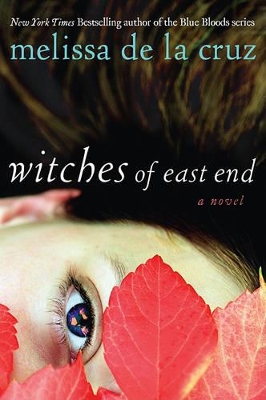Reviewed by jesstheaudiobookworm on
Before I go there, I should be fair: I enjoyed Witches of East End enough to finish it, give it a pretty favorable rating, and start the second installment. I also enjoyed it enough to foresee myself finishing the series and possibly any other spinoffs. Something about it reminds me of The CW’s show The Originals. I really like Melissa de la Cruz’s writing and I’ve already been researching her other series.
But when something is advertised as a story about witches, I expect for them to actually be…you know, witches. Not Norse goddesses who have magical powers like witches, which is what we’ve got going on here. When that point became clear well into the book, I groaned in disgust. Not because I have anything against Norse goddesses, but because I’m on a perpetual quest to find the perfect book about witches and this was really close to being it. Okay, not perfect. But I have this idea of how witches should be written (close to American Horror Story: Coven) and it doesn’t involve vampires, werewolves, or Norse gods and goddesses. I just want to read about witches. Why is that so difficult?
Rant aside, I rolled with the Norse goddess thing as best I could. I’m not that well-versed on Norse mythology and I haven’t seen any of the Thor movies, but I still appreciated what Melissa de la Cruz was trying to do. Greek mythology is over used in literature, so basing these characters in Norse mythology was a welcomed change. I just wish it had been marketed as such.
One of the things I enjoyed most about Witches of East End was the setting. It’s set in the Hamptons on Long Island and I can’t remember reading another story set there that wasn’t Gossip Girl or the like. The setting itself doesn’t really add much to the paranormal elements of the story, but the atmospheric setting is written well enough to give me a distinct sense of place while listening to the story. It’s definitely more memorable than some fictional Midwestern town would be, even if it doesn’t directly contribute to the paranormal events as somewhere like New Orleans would.
The plot in Witches of East End wasn’t super strong in this installment, but it felt like a first installment should. It was character-driven and laid a good foundation for the rest of the series. I’m really looking forward to being able to watch the television adaptation, assuming Netflix can get it itself together and offer more than the second season. But Until then, I’ll have to be content with listening to the rest of the series.
Narration review: Witches of East End brought Narrator Katie Schorr to my attention and I’m glad of it. Halfway through the audiobook, I began searching for more of Katie’s titles. Schorr’s ability to appropriately voice three female characters of vastly different age groups and personality types impressed me. Melissa de la Cruz’s writing style jumps between the three characters, often mid chapter and with little to no warning. If it weren’t for Schorr, I wouldn’t have known which way was up. I’m delighted that she is back narrating the second installment. ♣︎
Reading updates
- Started reading
- Finished reading
- 1 September, 2018: Reviewed
